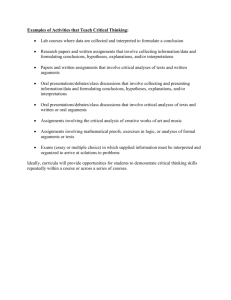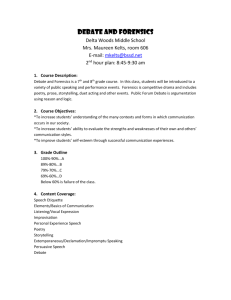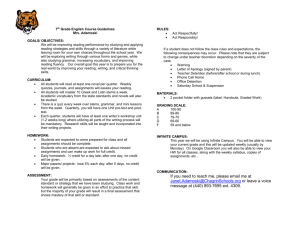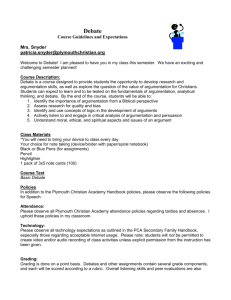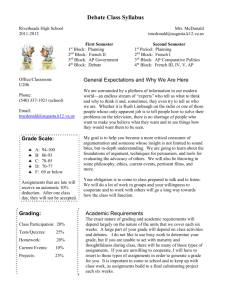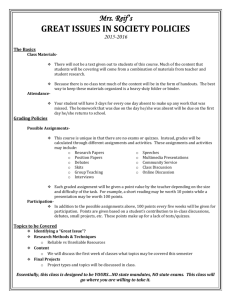SPCH 141-SP15 25KB Apr 16 2015 08:32:14 AM
advertisement
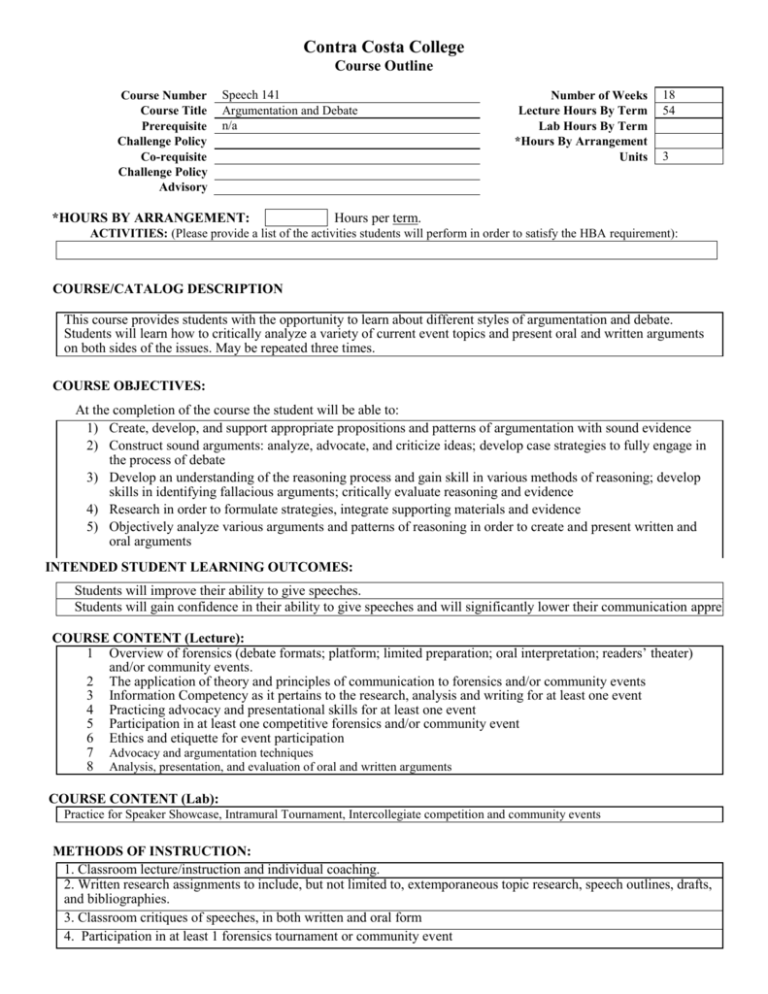
Contra Costa College Course Outline Course Number Course Title Prerequisite Challenge Policy Co-requisite Challenge Policy Advisory Speech 141 Argumentation and Debate n/a *HOURS BY ARRANGEMENT: Number of Weeks Lecture Hours By Term Lab Hours By Term *Hours By Arrangement Units 18 54 3 Hours per term. ACTIVITIES: (Please provide a list of the activities students will perform in order to satisfy the HBA requirement): COURSE/CATALOG DESCRIPTION This course provides students with the opportunity to learn about different styles of argumentation and debate. Students will learn how to critically analyze a variety of current event topics and present oral and written arguments on both sides of the issues. May be repeated three times. COURSE OBJECTIVES: At the completion of the course the student will be able to: 1) Create, develop, and support appropriate propositions and patterns of argumentation with sound evidence 2) Construct sound arguments: analyze, advocate, and criticize ideas; develop case strategies to fully engage in the process of debate 3) Develop an understanding of the reasoning process and gain skill in various methods of reasoning; develop skills in identifying fallacious arguments; critically evaluate reasoning and evidence 4) Research in order to formulate strategies, integrate supporting materials and evidence 5) Objectively analyze various arguments and patterns of reasoning in order to create and present written and oral arguments INTENDED STUDENT LEARNING OUTCOMES: Students will improve their ability to give speeches. Students will gain confidence in their ability to give speeches and will significantly lower their communication apprehension. COURSE CONTENT (Lecture): 1 Overview of forensics (debate formats; platform; limited preparation; oral interpretation; readers’ theater) and/or community events. 2 The application of theory and principles of communication to forensics and/or community events 3 Information Competency as it pertains to the research, analysis and writing for at least one event 4 Practicing advocacy and presentational skills for at least one event 5 Participation in at least one competitive forensics and/or community event 6 Ethics and etiquette for event participation 7 Advocacy and argumentation techniques 8 Analysis, presentation, and evaluation of oral and written arguments COURSE CONTENT (Lab): Practice for Speaker Showcase, Intramural Tournament, Intercollegiate competition and community events METHODS OF INSTRUCTION: 1. Classroom lecture/instruction and individual coaching. 2. Written research assignments to include, but not limited to, extemporaneous topic research, speech outlines, drafts, and bibliographies. 3. Classroom critiques of speeches, in both written and oral form 4. Participation in at least 1 forensics tournament or community event INSTRUCTIONAL MATERIALS: NOTE: To be UC/CSU transferable, the text must be dated within the last 7 years OR a statement of justification for a text beyond the last 7 years must be included. Textbook Title: Author: Publisher: Edition/Date: Textbook Reading Level: Justification Statement: Public Speaking for College, Competition, and Career Diestler, Giusto, et. all Fountainhead Press 2nd edition, 2015 12th grade (For textbook beyond 7 years) Lab Manual Title (if applicable): Author: Publisher: Edition/Date: OUTSIDE OF CLASS WEEKLY ASSIGNMENTS: Title 5, section 55002.5 establishes that a range of 48-54 hours of lecture, study, or lab work is required for one unit of credit. For each hour of lecture, students should be required to spend an additional two hours of study outside of class to earn one unit of credit. Title 5, section 55002(a) 2F establishes coursework should call “for critical thinking and the understanding and application of concepts determined by the curriculum committee to be at college level.” For degree applicable courses: List one example of critical thinking out-of-class assignments Outside of Class Weekly Assignments Hours per week OUTSIDE OF CLASS WEEKLY ASSIGNMENTS: Title 5, section 55002.5 establishes that a range of 48-54 hours of lecture, study, or lab work is required for one unit of credit. For each hour of lecture, students should be required to spend an additional two hours of study outside of class to earn one unit of credit. Title 5, section 55002(a) 2F establishes coursework should call “for critical thinking and the understanding and application of concepts determined by the curriculum committee to be at college level.” For degree applicable courses: List one example of critical thinking out-of-class assignments Outside of Class Weekly Assignments Hours per week Weekly Reading Assignments (Include detailed assignment below, if applicable) 2-4 Reading assignments will include case briefs and research materials for in class debate sessions. Example: Read the sections on factual, value, and policy debates and be able to identify each format. Weekly Writing Assignments (Include detailed assignment below, if applicable) 2 Writing assignments will include case briefs, argument shells and short response essays. Example: Create a plan for the affirmative on a given debate topic; include harms, inherency, significance, and solvency. Weekly Math Problems (Include detailed assignment below, if applicable) N/A Lab or Software Application Assignments (Include detailed assignment below, if applicable) N/A Other Performance Assignments (Include detailed assignment below, if applicable) 2-4 Performance assignments will include in class debates, position speeches, impromptu speeches, and intercollegiate competitions. STUDENT EVALUATION: (Show percentage breakdown for evaluation instruments) Title 5, section 55002 (a) 2A requires that the grade be based on demonstrated proficiency in subject matter. For degree applicable courses: Course requires essay writing, or, in courses where the curriculum committee deems appropriate, problem solving exercises, or skills demonstrations by students. Title 5, section 55002(a) 2F requires that coursework call for critical thinking and the understanding and application of concepts determined by the curriculum committee to be at college level. For degree applicable courses: List (an) example(s) of methods of evaluation that assess critical thinking. % Essay Students will prepare case briefs and argument shells for in class debates. Computation or Non-computational Problem Solving Skills % Skills Demonstration % Students will participate in classroom debates, and the campus intramural debate tournament. Students will also demonstrate the ability to judge debates. % Objective Examinations % % % Quizzes on debate terminology. Other (describe) Attendance and participation in class and off-campus debate tournaments. GRADING POLICY: (Choose LG, P/NP, or SC) Letter Grade 90% - 100% = A 80% - 89% = B 70% - 79% = C 60% - 69% = D Below 60% = F Pass / No Pass 70% and above = Pass Below 70% = No Pass Joseph Carver and Sherry Diestler Date: 2/17/2015 Prepared by: Revised form 08/14 X Student Choice 90% - 100% = A 80% - 89% = B 70% - 79% = C 60% - 69% = D Below 60% = F or 70% and above = Pass Below 70% = No Pass


